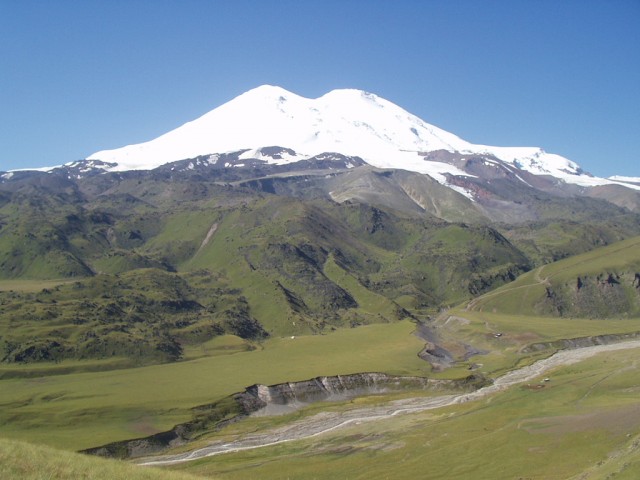Elbrus, Mount
MOUNT ELBRUS IS the highest point in Europe, at 18,513 ft (5,642 m). It is the central peak of the CAUCASUS MOUNTAINS range, located 6.8 mi (11 km) north of the main ridge that forms the boundary between GEORGIA and RUSSIA, thus placing the mountain within Europe, since the traditional dividing line between Asia and Europe is along the main ridge of the Caucasus. The closest large town is Tyrnyauz, in the autonomous region of Kabardino-Balkaria, while the largest city with air and rail links is the Russian city of Pyatigorsk, 62 mi (100 km) to the north.
Elbrus is an extinct minor volcano that retains its conical shape characteristic of volcanic peaks. There are two summits, which are actually quite close in elevation. The lower summit (to the east) is only 72 ft (21 m) lower. In between the two, the area known as the Saddle has an elevation of 17,769 ft (5,416 m). Other notable features are the Pastuckhov Rocks, at about 15,400 ft (4,700 m). The snow line in August lies at about 11,483 ft (3,400 m), above which the mountain supports a permanent icecap and 22 glaciers that covers about 56 square mi (144 square km). The runoff from these glaciers feeds major rivers, including the Baksan, Kuban, and Malka, flowing either west to the Sea of Azov, or east to the CASPIAN SEA.

Mount Elbrus was known to the ancient Greeks (called Mount Stroblius) and was the setting of the myth of Prometheus, chained to a rock atop this peak as punishment for bringing fire to humanity. Mountaineering became popular in the region from the late 19th century, accelerated by the first successful ascent to the top in 1874, followed by state sponsorship by the Soviets in the 1930s.
The mountain became one of the symbols of communist society's dominance and control of the wilds of the natural world. Since then the sport has only increased in popularity, resulting in frequent crowds of rock climbers. Visitors use cable car systems built in the 1960s, from the nearest mountain villages (Azau, Cheget and Tershol), located at about 6,560 ft (2,000 m). The cable cars extend to 12,450 ft (3,800 m), after which the ascent to the summit is nearly vertical.